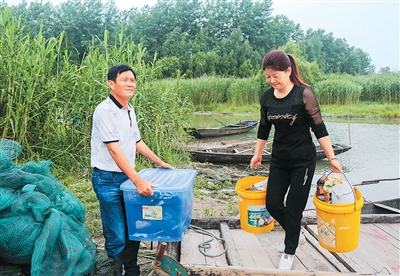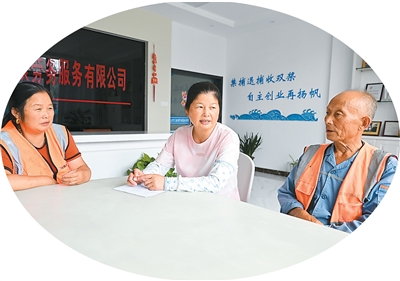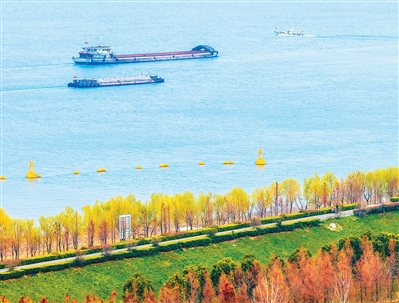




- BRNN
- BRI News
- BRNN News
- Database
Official Documents Polices and Regulations
Inter-government Documents International Cooperation BRI Countries
Business Guide Economic Data BRI Data
Trade
Investment Projects Latest projects
Cases - Content Pool
Ahead of this year's May Day holiday travel rush, Chen Lanxiang, head of a labor service company in Ma'anshan, east China's Anhui Province, organized a group tour to Yangzhou in neighboring Jiangsu Province for a number of former fishermen.

A photo shows Chen Lanxiang and her husband Zhang Zhouhua six years ago in Ma'anshan, east China's Anhui Province. (Photo courtesy of the interviewee)
"This was the first group trip for our former fishermen in decades, and everyone had a wonderful time," Chen said.
She reflected on the dramatic changes since she gave up fishing in 2019 as part of a government program to protect the Yangtze River.
"Without the government's support for transitioning fishermen, we wouldn’t be able to travel — just making a living would have been difficult," she said.
Xuejiawa, on the eastern shore of the Yangtze River in Ma'anshan, once had more than 200 fishing boats and over 50 fishing families. The ecological environment suffered as domestic sewage was discharged directly into the river and garbage littered the area.
After marrying fisherman Zhang Zhouhua in 1995, Chen spent more than 20 years living on boats, relying solely on fishing for income. However, fish stocks dwindled each year, and earnings steadily declined.
The turning point came in 2019, when Ma'anshan was chosen as a pilot site for a national program to relocate fishermen from the Yangtze River and its tributaries and help them find alternative livelihoods.
Chen's family gave up five fishing boats on May 20, 2019. In less than three months, 10,757 fishermen in Ma'anshan had relinquished their nets and transitioned to new opportunities, completing the process a year and a half ahead of the national timeline.
Benefiting from the withdrawal policies, Chen's family received more than 200,000 yuan ($28,000) in subsidies and moved into a 100-square-meter, two-bedroom apartment. The government also purchased basic pension insurance for them. Her husband soon joined the local waterway patrol team, earning more than 3,000 yuan per month.

Chen Lanxiang, center, talks with employees at her labor service company in Ma'anshan, east China's Anhui Province. (Xinhua/Zhou Mu)
After moving ashore and giving up fishing, Chen stayed active. She took part in job training, during which she came up with the idea of starting a labor service company. Although her family initially doubted the plan, she was determined to make it work.
On Dec. 20, 2020, with support from the local government, Chen launched her labor service company, bringing in eight former fishermen as shareholders.
Chen recalls her first contract in January 2021 — a cleaning job for a local market. "At the time, I didn't even know how to draft a contract or handle budgeting, but I was determined to succeed. There are always more solutions than problems," she said. Chen sought advice from professionals and gradually learned how to run a business.
Thanks to her efforts, the company steadily grew, earned a strong reputation and became profitable in its second year.
The company has grown from six employees at the start to 75 today. Its business volume has steadily increased, with revenue doubling from 1.6 million yuan in 2021 to 3.2 million yuan in 2024.

A view of the Yangtze River at the Cihu high-tech industrial development zone in Ma'anshan, east China's Anhui Province. (Photo/Zhang Mingwei)
Since 2022, Chen has distributed annual dividends, totaling 680,000 yuan for all shareholders as of this year.
Chen joined the Party in 2023. As a Party member and former fisherwoman, she actively promotes the benefits of the Yangtze River environmental protection initiative, sharing her own story to encourage others to support and protect the river.
As a result, she was elected as a deputy to the Ma'anshan Municipal People's Congress and made her first proposal on environmental protection.
Chen's husband, a former skilled fisherman, has worked with the local waterway patrol team for more than five years. He patrols more than 10 kilometers of river each day, cleaning the riverside and monitoring enforcement of the fishing ban.
Beyond employing former fishermen, Chen also established a "Fishermen's Home," dedicating 9 percent of her company's annual profits to a reserve fund helping former fishermen overcome major life challenges.
"We former fishermen are witnesses to the Yangtze River environmental protection initiative and beneficiaries of the withdrawal policies. We should also be active participants in protecting the Yangtze River," Chen said.

Tel:86-10-65363107, 86-10-65368220, 86-10-65363106